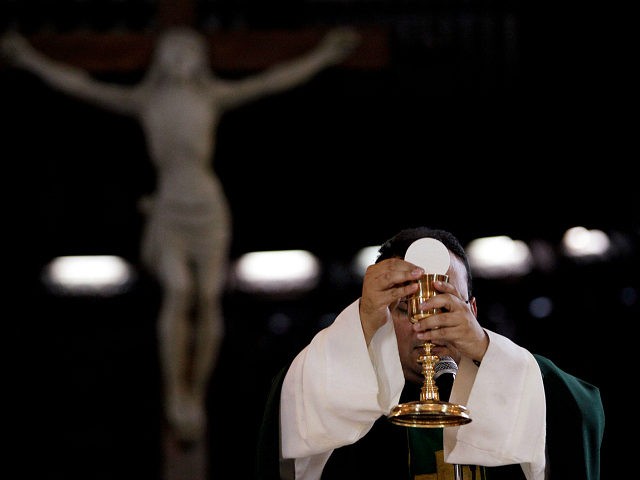The progressive Catholic Church in Germany continues its inexorable slide toward irrelevance as it hemorrhages members year after year, losing an additional 160,000 in 2016 according to recent reports.
Statistics released by the Catholic Church in Germany reveal that 162,093 Catholics left the Church in Germany during 2016 and 537 additional parishes were closed down.
Since 1996, the Catholic population in Germany has shrunk from 27,533,000 to 23,582,000—a decline of over 14 percent.
The number of Catholic parishes has followed a similar trend, Over the past two decades, the Church has shut down nearly a quarter of its parishes (over 3,000), with the number declining from 13,329 to 10,280. Sunday Mass attendance continues to drop as well, with 10.2 percent attending Mass regularly in 2016 versus 10.4 percent in 2015.
The situation is so dire that in 2015 Pope Francis cited statistic after statistic before a group of German bishops, asking why the Church in Germany is in freefall.
Francis noted there has been “a drastic drop in Sunday Mass attendance” and in the whole of Catholic sacramental life in Germany, especially in traditionally Catholic areas.
“Whereas in the 1960s wherever you went almost every Catholic participated in Sunday Mass,” he said, “nowadays it’s often less than ten percent. Fewer and fewer receive the sacraments and the Sacrament of Penance [confession] has all but disappeared.”
“Fewer and fewer Catholics receive the Sacrament of Confirmation or get married in church,” he added, “and the number of vocations to the priesthood and consecrated life is severely diminished.”
According to one analysis, there are two principle causes behind the erosion of the Catholic faith in Germany, one financial and the other doctrinal.
In his article titled “The Bleeding German Church,” Vatican journalist Marco Tosatti said that the close alliance between church and state, with believers being charged a special church tax or “Kirchensteuer,” has undoubtedly contributed to the problem.
The second cause of German defection from the Church is an ever more progressive trend away from traditional Catholic belief and practice toward a position often associated with mainline Protestantism, Tosatti said.
As a body, the German Church is now known as one of the most progressive in the world, a trend that has made the Church ever more irrelevant for many.
Germany was evangelized by the great Saint Boniface in the eighth century. Beginning in 719 after a meeting with the Pope Gregory II in Rome, Boniface traveled as a missionary throughout present-day southern and central Germany, preaching the gospel in Bavaria, Thuringia, Franconia and Hessen, regions with little or no Christian presence.
The politically incorrect missionary tore down pagan temples and shrines, urging people to abandon idolatry and worship the one, true God. In one dramatic gesture, Boniface and his followers felled a massive oak tree that was considered sacred to Thor, the god of thunder. Boniface took the wood from the tree and built a Christian chapel on the very site where the tree had stood.
In a recent interview with the Italian newspaper Il Foglio, Cardinal Gerhard Müller—the former head of the Vatican’s doctrinal office—commented on the decline of the German Church.
“Active participation has diminished considerably, as has the transmission of the faith not as a theory but as an encounter with Jesus Christ. The same has happened with religious vocations.”
Europe, he said, was undergoing a “forced de-Christianization” that goes “way beyond secularization”
“It is the de-Christianization of the entire anthropological base, with man strictly defined without God and without transcendence,” he said. “Religion is lived as a sentiment, not as adoration of God, Creator and Savior.”
Follow Thomas D. Williams on Twitter Follow @tdwilliamsrome

COMMENTS
Please let us know if you're having issues with commenting.